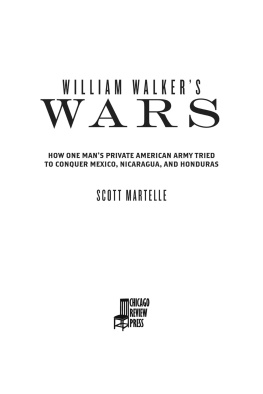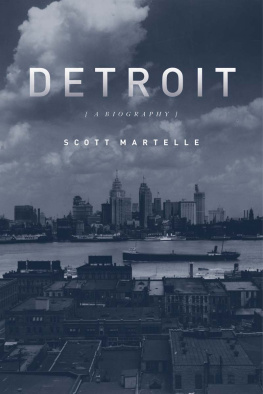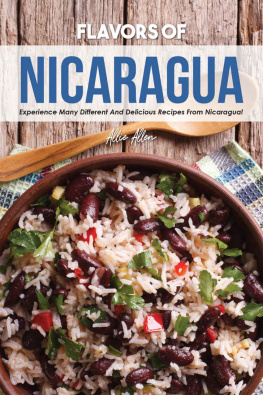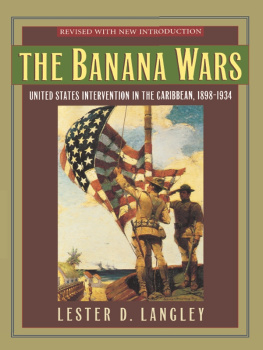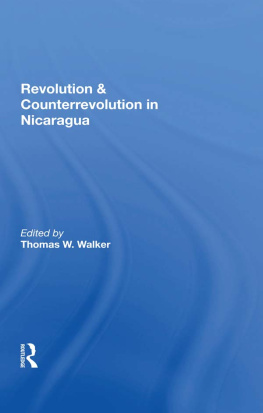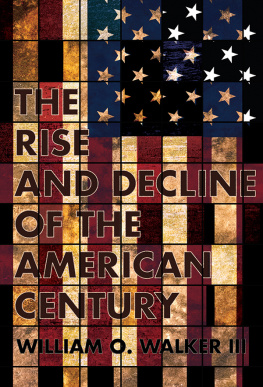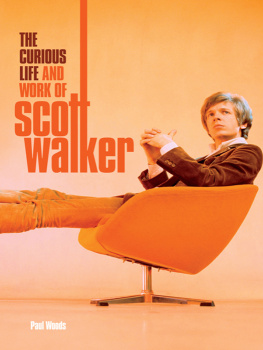Scott Martelle - William Walker’s Wars: How One Man’s Private American Army Tried to Conquer Mexico, Nicaragua, and Honduras
Here you can read online Scott Martelle - William Walker’s Wars: How One Man’s Private American Army Tried to Conquer Mexico, Nicaragua, and Honduras full text of the book (entire story) in english for free. Download pdf and epub, get meaning, cover and reviews about this ebook. year: 2018, publisher: Chicago Review Press, genre: History. Description of the work, (preface) as well as reviews are available. Best literature library LitArk.com created for fans of good reading and offers a wide selection of genres:
Romance novel
Science fiction
Adventure
Detective
Science
History
Home and family
Prose
Art
Politics
Computer
Non-fiction
Religion
Business
Children
Humor
Choose a favorite category and find really read worthwhile books. Enjoy immersion in the world of imagination, feel the emotions of the characters or learn something new for yourself, make an fascinating discovery.
- Book:William Walker’s Wars: How One Man’s Private American Army Tried to Conquer Mexico, Nicaragua, and Honduras
- Author:
- Publisher:Chicago Review Press
- Genre:
- Year:2018
- Rating:5 / 5
- Favourites:Add to favourites
- Your mark:
- 100
- 1
- 2
- 3
- 4
- 5
William Walker’s Wars: How One Man’s Private American Army Tried to Conquer Mexico, Nicaragua, and Honduras: summary, description and annotation
We offer to read an annotation, description, summary or preface (depends on what the author of the book "William Walker’s Wars: How One Man’s Private American Army Tried to Conquer Mexico, Nicaragua, and Honduras" wrote himself). If you haven't found the necessary information about the book — write in the comments, we will try to find it.
Scott Martelle: author's other books
Who wrote William Walker’s Wars: How One Man’s Private American Army Tried to Conquer Mexico, Nicaragua, and Honduras? Find out the surname, the name of the author of the book and a list of all author's works by series.
William Walker’s Wars: How One Man’s Private American Army Tried to Conquer Mexico, Nicaragua, and Honduras — read online for free the complete book (whole text) full work
Below is the text of the book, divided by pages. System saving the place of the last page read, allows you to conveniently read the book "William Walker’s Wars: How One Man’s Private American Army Tried to Conquer Mexico, Nicaragua, and Honduras" online for free, without having to search again every time where you left off. Put a bookmark, and you can go to the page where you finished reading at any time.
Font size:
Interval:
Bookmark:
Copyright 2019 by Scott Martelle
All rights reserved
Published by Chicago Review Press Incorporated
814 North Franklin Street
Chicago, Illinois 60610
ISBN 978-1-61373-732-3
Library of Congress Cataloging-in-Publication Data
Names: Martelle, Scott, 1958 author.
Title: William Walkers wars : how one mans private American army tried to
conquer Mexico, Nicaragua, and Honduras / Scott Martelle.
Description: Chicago, Illinois : Chicago Review Press Incorporated, [2019] |
Includes bibliographical references and index.
Identifiers: LCCN 2018009571 (print) | LCCN 2018033295 (ebook) | ISBN
9781613737309 (adobe pdf) | ISBN 9781613737316 (kindle) | ISBN
9781613737323 (epub) | ISBN 9781613737293 (cloth)
Subjects: LCSH: Walker, William, 18241860. | NicaraguaHistoryFilibuster
War, 18551860. | FilibustersNicaraguaBiography. | FilibustersUnited
StatesBiography. | AmericansNicaraguaHistory19th century.
Classification: LCC F1526.27.W3 (ebook) | LCC F1526.27.W3 M37 2019 (print) |
DDC 972.85/044092 [B] dc23
LC record available at https://lccn.loc.gov/2018009571
Typesetting: Nord Compo
Map design: Chris Erichsen
Printed in the United States of America
5 4 3 2 1
This digital document has been produced by Nord Compo.
For the lovely Margaret, as always,
and for Rochelle Lewis Lavin,
a dear friend and fighter of great courage
WITHIN THE STONE WALLS of the three-hundred-year-old Fortaleza de Santa Brbara, dozens of men, some wearing rags and blood-soaked bandages, worked quietly in soft lamplight, their faces glistening with sweat from stress, humidity, and fever. They struggled to bend the barrels on rifles, drive spikes into the touchholes of cannons, and drench surplus gunpowder with water. Anything to ensure that the weapons theyd leave behind would be worthless to whichever enemy took overthe Honduran soldiers just beyond rifle range, or British marines from the HMS Icarus at anchor nearby in the warm Caribbean waters.
Not all of the men were fit enough to flee, though. Bullet wounds immobilized three of them, and illness incapacitated three others, including a New York Herald journalist sent to write about the adventurers. A surgeon and an aide would likewise remain behind to oversee their care in a makeshift hospital ward created by stringing hammocks across a large room. Each of them was given a gun and a small reserve of ammunition in case they needed to defend themselves against an attack, but their plan was to beg mercy from whoever arrived first.
As the weapon wreckers worked, William Walkera short slip of a man with light blond hair and eerily expressionless gray eyesmoved among the hammocks to offer thanks and final words of encouragement to the sick and the wounded. Even though they were Walkers menhis soldiers, reallyhe barely knew most of them. But one, Colonel Thomas Henry, had been a close confidant and strategic adviser, and Walker spent a few extra minutes with him, speaking softly into his ear above the gaping, maggoty wound where his jaw had been shot away. Walker asked whether Henry had uncovered any information that would help them track down Jos Trinidad Cabaas, the former Honduran president now waging an insurrection against the current government. Henry, numbed by morphine, scrawled an answer on a piece of paper: Cabaas would be found somewhere along the Ro Negro (now the Ro Seco), about forty miles east of Trujillo. Walker whispered a few more words, then rushed the visit to an end.
The weapons sabotaged and a path forward determined, Walker ordered his remaining menabout seventy of them in various states of health and strengthto gather on the forts parade grounds. Showing unusual discipline for such a ragtag squadron, the men quietly assembled a little after midnight then followed Walker through the ancient forts main gate and over empty streets before disappearing into the jungle.
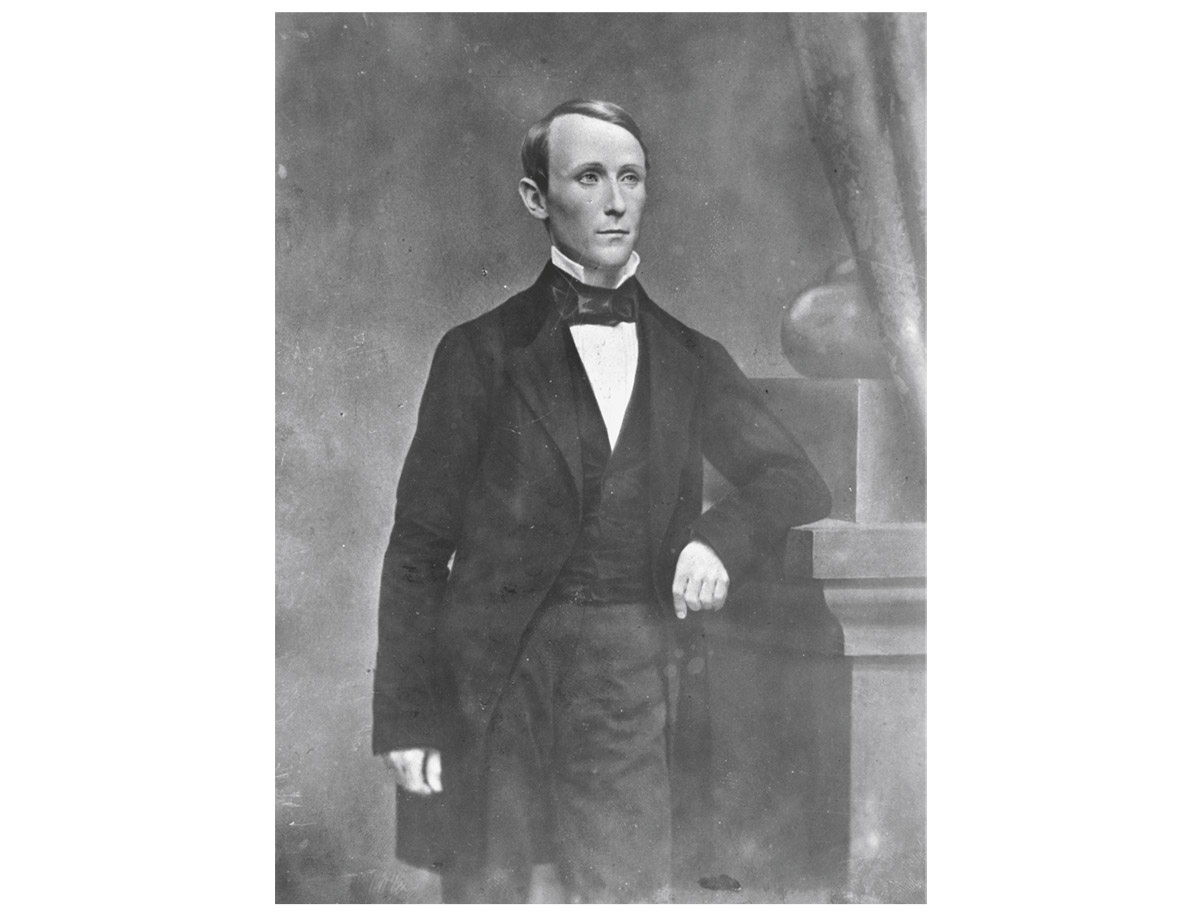
William Walker. Mathew Brady, courtesy of Library of Congress Prints and Photographs Division, LC-USZC4-10802
Skulking off in the middle of the night had not been in Walkers plans. Hed left New Orleans nearly three months earlier expecting to take over the small Caribbean island of Ruatan, less than fifty miles off Trujillo, at the invitation of English residents who feared for their futures once Great Britain fulfilled a treaty promise and turned the island over to Honduras. But Walkers infamy preceded him. After learning he was in the area, the British delayed the handover, leaving the Union Jack fluttering high above the islands main settlement, Coxen Hole. Walker neither wanted nor could win a battle against British warships, so he decided instead to seize Trujillo and from there invade Nicaragua, his ultimate target all along. But that plan ran into trouble, too, with the arrival of the Icarus and a demand from its captain that Walker and his men surrender. Instead, they ran.
The force traveled lightly, each man bearing a rifle and 120 rounds of ammunition, and a few also carrying sidearms and knives. Paralleling the Caribbean coast, they made their way east through the moonless night and into the next day, a remarkable display of stamina against Augusts tropical heat and humidity. They passed through hamlets whose residents hid from view and along jungle paths as birds squawked and trilled and small monkeys howled and chattered. Walker stopped them at dusk to establish a camp along the bank of a creek, but shortly after sunrise the men forded the river and marched on. They raided small farms but found little to eat except beef. When night fell, they again camped, and at daybreak they resumed their flight. By midafternoon, Walker felt they had put enough distance between themselves and Trujillo for the men to take a lengthy rest, clean their weapons, and let some of the heat of the day dissipate before trying to walk any farther.
As the men relaxed at a spot along a wide creek, gunfire exploded from the underbrush, the lead balls shredding leaves and slamming into the earth, tree trunks, and human flesh. The Americans scattered and dove for protection. Some returned fire at the attacking Honduran soldiers as others hastily put their weapons back together. Amid the chaos, Walker ordered the men into two small companies, then sent them sprinting into the brush in a screaming wave of suicidal bravado and gunfire, panicking the Hondurans into flight. But the battle was costly. Theyd spent valuable ammunition, and Walker counted one dead and seven or eight others wounded. The commander himself was among them: blood oozed from Walkers creased cheek.
The men quickly packed up and moved on, carrying the severely wounded and helping the sick. As they worked their way along the trail, occasional harassing gunshots came from behind, one of which struck a top aide, Major Huff, adding to the list of casualties. They reached a mahogany camp near the coastal town of Limn that Walker was surprised to find abandoned, and soon they were off again. Reaching the Ro Negro, they found a canoe and ferried themselves across to a trading post run by an Englishman named Dickens. There they also discovered what was left of Cabaass encampment: cold campfires and empty rifle pits. We are lost, one soldier wrote.
The Hondurans were stuck on the other side of the river, but escaping them had left Walkers men exhausted, bleeding, and even sicker and more dispirited. No good would come of pushing them further, so Walker ordered the men to bivouac in Cabaass rifle pits, which offered a little protection from the occasional potshots their pursuers fired across the Ro Negro. Walker himself, shivering and sweating with fever, commandeered Dickenss house as his headquarters. Every once in a while, the same soldier wrote, one of their bullets hits a man, and we have none to spare.... Walker calls the rollthirty-one [healthy and unwounded] men are left.
Font size:
Interval:
Bookmark:
Similar books «William Walker’s Wars: How One Man’s Private American Army Tried to Conquer Mexico, Nicaragua, and Honduras»
Look at similar books to William Walker’s Wars: How One Man’s Private American Army Tried to Conquer Mexico, Nicaragua, and Honduras. We have selected literature similar in name and meaning in the hope of providing readers with more options to find new, interesting, not yet read works.
Discussion, reviews of the book William Walker’s Wars: How One Man’s Private American Army Tried to Conquer Mexico, Nicaragua, and Honduras and just readers' own opinions. Leave your comments, write what you think about the work, its meaning or the main characters. Specify what exactly you liked and what you didn't like, and why you think so.

